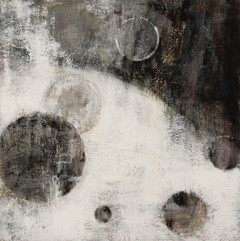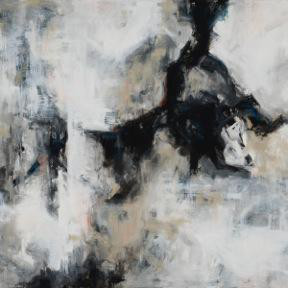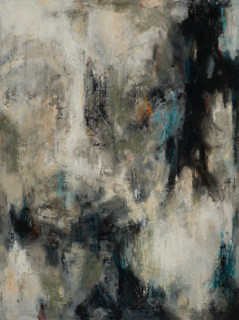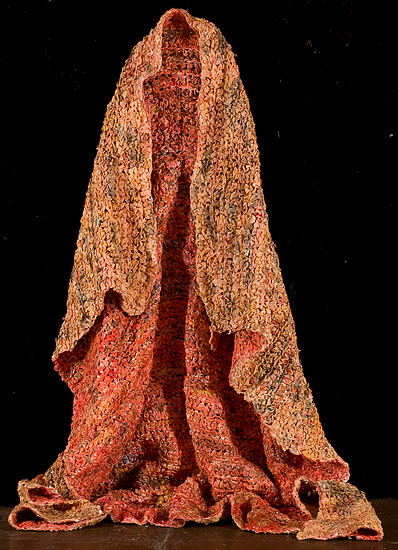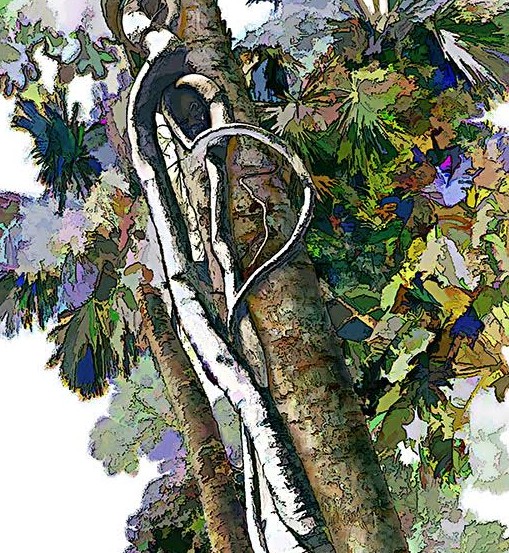
“Atmospheric Cells” by Jane Cornish Smith, oil, collage, and encaustic on board, 2007.
My belly’s a curious mix of loathing and dread as I look down the long hall to the doctor’s office where I have an appointment in fifteen minutes. Compulsively early, despite my one-mile walk from school, I wait sitting on the top step of the stairs of the two-story brick bank building. I hike the skirt of my too-tight green plaid dress high above my waist so I am not trapped, for the moment, in folds of cloth or body. I open my legs, get some air on my rubbed-red thighs. The quiet hallway leads directly to his office door, a place I’ve been before with my mother, though I never met the doctor. I always stay in the waiting room.
On this brisk fall day, the sky rolls with midwestern grayness that signals emerging cold and eventual winter. In my nervousness, I peer down the open landing. I see stairs spiral into darkness, and I wonder what other offices hide inside the solid brick bank’s respectability.
It’s yet another doctor visit today, one of many during childhood, all instigated from my mother’s urgent issue to solve my weight problem. But since I am eleven, she decides to send me out this time on my own. I’m glad she isn’t here to nag about the state of my dress or to remind me to suck in my stomach—glad to avoid her judgment and the mean comments she hisses before and after each exam. A veteran, I know all about medical visits and my constant failure at losing weight. All I know is to be myself: fat. It is the only way I know myself.
At precisely 4pm, I walk into Dr. Trask’s waiting room. The receptionist gestures me to sign in. I make my way past stained yellow couches, pillows forlornly bunched into corners, a smattering of magazines spread over a couple of battered tables. Achy with nerves, I know what’s behind the door. How I dread the weigh-in, lecture, disapproval, and critique for a problem that seems unsolvable. I pick up a magazine, and pretend to read an old copy of Family Circle. It doesn’t appeal to me with its homey stories, but I’m too afraid of my body to pick up Seventeen or Teen. Mother reads fashion magazines, attached as she is to hairstyles, beautiful clothing, matching sets of earrings and necklaces, the perfect makeup she slathers on each day, then slips on the highest of heels. But I settle for flipping pages of an adult magazine because that seems to be the correct behavior. At least I appear to know what is normal activity.
When the nurse finally opens the inner door, she summons me with one long white finger. The office is empty. I trail behind her crisp figure, entirely dressed in white, until we come to a tiny examination room. Her hair is gray around the edges of her flat face. She looks as if someone hit her with a cream pie, leaving white streaks around her face. It’s true, I think, that nurses always dress the same way. I’ve seen years of spanking white uniforms, white oxfords and white stockings, and always a strange little organdy fluted cap atop the head, with a black band across the front. That hat differs from office to office. But I awake from my rambling thoughts as this new nurse is all business.
Get on the scale. She records my shame on a manila folder after the scale creaks with my weight.
Strip. Everything off, she says, hands me a gray examination robe pulled from a cabinet next to the sink. More scared than modest, I wait until she leaves to hurriedly unzip my favorite dress. I stash my underclothing beneath it on the gray metal chair—my rumpled slip, panty girdle, and white underpants. The clammy robe opens down the back and I maneuver onto the high table, careful to keep the robe tucked under my butt. Already chilly, I grow colder, my belly beads in fistfuls of anxiety as I try to keep rigidly still, my back perfectly straight.
Unsuccessfully, I try to think of anything other than what is sure to be coming—a speech about my fatness from a new doctor who will scold and lecture me about my weight.
I don’t know how long I wait for him, only that by the time Dr. Trask arrives I’m wound so tightly I’m a gassy mix of fear and danger. He does not even look at me when he shuts the door, doesn’t offer his hand or a greeting—just a quick once-over gesture towards me with his ball-bearing eyes.
I peek at him. A short man in an expensive dark tweed jacket, he wears gray pants pressed to a crease sharp enough to slit someone’s wrists. His black loafers are shiny. When he finally looks directly at me, he appears to be truly glad to meet me. I see it his bearded, friendly middle-aged face though I can’t imagine why he’d like a fat seventh grade girl.
We’re here to discuss your weight problem, he says while clasping and unclasping his small white hands. They look like birds pacing the telephone wires by our house, nervously twitching, yet perfectly sure they will never fall.
Please stretch out on the table, he says, offers one dry hand to help me ease along the white paper, directing my body with a gentle gesture. Strangely, he begins his exam at my toes, touches each little piggy with cool fingers then rests one hand on each leg, as he pats and squeezes my flesh.
Remove the gown, please.
I wiggle it off and his hands reach to pull it away. He tosses it on top of my green dress and carefully hidden underwear. Naked and shivering in the windowless room, I stare up at the ceiling, ignoring him as his hands rub my calves and then my thighs. I want to leave, do anything to avoid this moment, but know I can’t escape the tiny room.
Open your legs.
I’m startled when his scratchy hands push my legs open wider than I parted them. He stares and stares in silence. How long he looks, I don’t know and what he hopes to discover I can only guess are signs of sexual activity. This worries me as my father has been having sex with me for years—full-on intercourse—and I wonder how my genitals look. I try to forget the doctor and his light touch as he probes the depths of my vagina, but it is so difficult. Abruptly he closes my legs, runs dainty fingertips over my round soft belly, strokes backward, down to the top of my now-closed thighs. Awash in the unexpected but familiar blend of deep pleasure and shame, all I think about in the crazy whirl is how I am stuck to the paper, my head and back so wet from sweat that I’m embarrassed of my fear.
The wordless exam continues as he works my body, hesitating here and there, allowing additional time for more focus for particular spots of interest. Much time is spent handling my small breasts and achy nipples. Finally he moves to my arms and hands, leaving nothing untouched. Flips me over. Then turns me face up. Finally, at the end of his exam, he ruffles my hair like someone reassuring an anxious new pet.
Get dressed and come to my office across the hall, he instructs, and closes the door.
I stagger off the table, feeling strangely like Mr. Whiskers, the huge white rabbit my science class is studying. When he gets rattled, he hops around his cage, moving faster and faster. Over stimulation—noise and activity—send him careening around the chickenwire enclosure, desperate to get out. He crashes from side to side until he finally calms. So relieved that the scrutiny is complete, I dress at a languid pace.
Dr. Trask’s office is large, a big window peering into the brick building next door, and one wall is covered floor to ceiling in what I assume are medical texts. When I see him behind his wide desk, I think of my grandmother, so short that when she drives her big car, she can barely see above the dashboard, her body straining on the car seat. He seems far away and strange; he stares at me, those hands clasped in a tight little knot of flesh.
You are too heavy for your age and short stature, he flatly says, pushes a packet of diet information towards me. I want you to be weighed and examined every Friday at today’s appointment time. You have stretch marks on your stomach and breasts and we want to stop that immediately, he adds, a sharp criticism I didn’t expect. My blush deepens.
I listen and try to stay the real me, stuck in this new room, with a strange man who says and did such odd yet familiar things to my body. From a distance, somewhere above the room, I float into the ceiling, watch me, the fat girl, swipe at the packet of papers but I’m too short to reach them. He writes out a prescription and it settles on the pile. I half-stand, grab the papers, stuff them into my purse. The real me stands up.
On your way then. Be here next week. He pushes his glasses up his nose, reaches for a book, dismissing me and my imperfect body. And yet, I think as I flee the building, even with all my blemishes, he seems enthralled.
Walking home, I violently kick piles of leaves homeowners carefully raked to the curb for burning, their dry scuttled skins cracking beneath my heavy shoes and gait. Confused, I’m also strangely elated, which makes me walk faster, kicking additional mounds of leaves into scattered shells. So much bad news he expresses about my ugly body, yet his hands caressed me lovingly, even if I’m damaged. Dimly, I wonder what kind of a girl receives his touch, who trembles in unexplainable longing.
Despite my unusual swiftness, he has already called and talked to my mother about my weight, but only about the facts of the exam.
His instructions she tells me are to take amphetamines three times daily to kill your appetite and speed up your lazy metabolism. Then Mother takes me with her to Walgreen’s and while we wait for my prescription to be filled, we shop the liquor department, purchasing her usual supplies—half gallon bottles of gin and bourbon.
As instructed, I return to Dr. Trask’s office each week to be weighed, swathed in a shimmer of desire and despair. Always the white nurse weighs me, records the success of a half-pound loss or the crush of failure of a weight gain into my chart. Mostly the doctor proceeds to examine me like the first time, touching me a little bit more each time we meet. Yet sometimes he doesn’t summon me at all. Secretly, I’m very sad when I don’t see him, but also I’m so relieved that I have to sit on the floor on the landing when the visit is over in order to catch my breath with my two hands as my pulse hammers in my throat, making it difficult to breathe.
Whether he sees me or not, he always calls my mother weekly, reporting my progress and discussing my eating habits. He orders her to buy me new bras with enough room for my breasts to grow.
He worries my mother tells me, about the stretch marks on my breasts. He wants them, she says to be beautiful. Then she goes back to reading the book splayed on the coffee table next to her martini on its coaster. She ignores me, intent on her activities. I head to my room, puzzled by this new piece of information.
~
Mother pushes open the heavy glass door at Donny Caine Intimates and I’m right behind her as the string of tinkling bells announces our arrival at the plush lingerie shop neither of us has entered before. Mother orders all our clothes and nightgowns and underwear from the Montgomery Ward catalogue, so this is an adventure into the unknown.
I walk past the store hundreds of times on my way to and from other shops that make up our town’s little shopping center, barely daring to peek at the store’s lush display window. I’m attracted to its contents: the spill of nightgowns and bras sliding out of frothy white tissue paper from the store’s signature gold boxes. As each year progresses, I notice red bras and panties for Christmas, pink embroidered gowns for Valentine’s Day with red paper heart cut outs, and for Easter, a pastel mix of nighties. For Mother’s Day, sensible terry cloth robes and all summer, bridal finery of pure white pleated gowns, abbreviated satin robes and garters, smeared abundance. Intimates means lingerie which means sex, I translate. I already know a great deal about this, sex and costume, thanks to my father, even before I cross the threshold.
Once inside, I stake out the entire store, from long glass counters running along the north side, mannequins swathed in brilliant satin matching bra and panty sets, along with the sensible display of white, black, and beige underwear. Behind the counter are rows of glass fronted little drawers, each embracing some lingerie. Along the back, slips hang in rows by length and color, and more little drawers hold promises of finery.
A manicured saleslady approaches, wearing a black uniform-type dress and practical black low heels. Her hair is a marvel of upswept curls carefully pinned and hair sprayed. It doesn’t move.
May I help you?
She needs to be fitted for a bra Mother says.
This statement catches me so unaware that I gasp aloud. A trip to this kind of store for an unimaginable treat startles me. I thought we were on our way to Walgreen’s for liquor, but happen to stop here, in this elegant and flashy place on one of Mother’s many crazy whims.
The saleslady gracefully gestures with lovely hands towards a private dressing room behind a gray and pink striped curtain. Quite roomy, it contains a huge three-way full-length mirror, a gray wing-backed chair, and a matching small plush stool. A large gold ashtray stands beside the chair. Mother sits down, fumbles through her black Kelly handbag for her cigarettes and lighter. I stand awkwardly in the room’s center, right in front of the mirror.
Please remove your dress, young lady.
Greatly embarrassed to undress in front of my mother, I prepare for a barrage of insults from her lipstick-smeared mouth. I do what I’m told. The sales lady guides a measuring tape around my breasts then around my ribcage. It’s all surreal—the mirror, fancy underwear, my mother silent on the chair.
You’ll need to take off your slip and bra the saleslady says and quietly leaves the room. The crumpled slip and bra yank easily over my frizzy homemade hairdo.
Then Mother stares at me, as if searching my body for the first time. She seems to want to say something specific, but her face is blank, which means she has had a couple of drinks. Her hazel eyes flick over me, stop at my naked breasts. She lights another cigarette, picks tobacco from the unfiltered Camel from her tongue and turns back to rummage in her bag.
It’s the first time I’ve seen my entire body in a full length mirror attired only in my little girl white cotton underpants with faded sprigs of yellow flowers. The pants are too tight at the waist and thighs, the elastic nearly worn out, stretched to its fullest capacity.
Three versions of me look back, each in tired underpants, naked from the waist up. It’s true, I see a few slender red stretch marks sliding alongside my breasts, but even I can tell my breasts are small but beautiful ovals topped with pink nipples. I tremble at my image, my twinkling breasts. I’m lost in the mirror’s center, loving the side views of all three visions of me, all looking too. I fall in love with my breasts, their pure simplicity, their color and depth.
The curtain whisks open and the saleslady returns with an armful of bras. Right away I see that they are not teenage bras; those are stretchy fabrics and vibrant colors with plenty of give. The bras she sets down on the stool are not like the psychedelic bras I’ve seen on other girls at school when we change clothes for gym class.
A wispy lavender bra outstretched in her gentle hands, the saleslady tells me to bend forward, center a breast in each cup, pull up the straps and hook the back. Her cool hands help me place my breasts just right, then she assists me as I ease into the bra. I struggle a little. She reaches for another bra as I preen in the first, a partial peacock in the mirror.
A perfect job on the very first try she says, her dry face smiling at me in the mirror. The bra doesn’t fit correctly she explains too tight across the ribcage. So she leaves me in the snug but glorious bra and heads out to get a bigger size. In the mirror I see a fat girl who smiles at secrets, adores the way she looks—and brilliance in the way she shimmers in the foam of fabric with lacy cups and satin straps, the way the bra dips, revealing a little cleavage, new breasts bumping together to show a shadow.
Mother, still over on the chair, says nothing. No criticism, no instructions, no commands, not a single word. She crosses her legs and lights up another cigarette. All the while she stares at me in the mirror.
The saleslady returns with another load of bras and we try each one on, discuss advantages and disadvantages of each. I tell her which ones are my favorites, how I like lace in a peek-a-boo neckline, chains of roses embroidered across cups in another, something that shows a little flesh in a third. The bras are a mound of color, butter yellow, peach, wine rose, and then the practical in black, beige and white. They tip over the stool and onto the floor.
These bras fit the best she tells Mother, holding out six to choose from. How many do you require?
Four. Mother points to a black, pink, lavender, and a mint green. She stands says I’ll take matching panties for her, too. Then she leaves the dressing room with the sales lady.
A year younger than everyone in my class, and as the school’s fat girl, I know the importance of fitting in. I was thrilled to have a bra at all, though my breasts are small.
And suddenly, unexpectedly, miraculously, I have four beautiful bras to wear and show off, such a sudden contrast to Mother’s disdain just this year when she told me I really didn’t need one at all. Then she bought a Chubette bra, made for fat girls, without cups, just fabric.
Fully dressed, I leave the dressing room, wander over to the cash register and watch as the bras and panties are folded in layers of tissue paper, sealed with a gold DC sticker, then gently placed in a gold box, and slipped into a gold and white striped bag.
Strangely, Mother writes a check for what has to be a huge expense without complaint. Stunned at my good fortune, I reflect that Mother has never purchased her underwear from Donny Caine Intimates. She buys from the catalogue, too.
On the brief ride home, I clutch my bag, ecstatic with filigree and color, with the pure sexiness of lingerie. I don’t understand until later that all this glory has been acquired simply because Dr. Trask called my mother and insisted I needed grown-up underwear.
Next Friday’s office visit, he admires satiny straps and checks the cup size to be sure the mint green bra is roomy enough for my growing breasts. He likes observing my breasts, how I mold into the new bra. He likes me, still a child, dressed in adult panties that match the green bra. Without being told, I know what to wear, somehow guess that this largesse is not Mother’s idea. All the touching continues as he carefully removes the bra and fondles me, his pale fingers pinching my nipples. And the panties are removed for more touching, for penetration. He does what he always does.
But I notice the atmosphere in the tiny office is charged to a higher level, heightened as his little hands rub my body. Somehow I sense an understanding of my own desire and fear.
On the way home that afternoon, I wonder what he tells my mother after this first visit in my new adult underwear. Does he speak to her about anything other than my weight and the underwear? I doubt it. He grows less and less interested in weight and more interested in molesting me. And he makes me feel sexually strong with such a gift in the new lingerie that excites him so much. He is under a spell of his own making.
And even if that junior high school me in the three-way mirror has only one opportunity to discover her own beauty until adulthood, at least she has a bizarre shopping trip where the doctor’s name is never discussed. I dimly understand that preparation for that man is a combination of some weird kind of care, desire, abuse, love, and more—how could there be—and additional secrets.
But all fall and winter the pills inside my belly make me want to rocket out of my seat in class, they want me up and moving. Despite my extreme shyness, I even volunteer to take the homeroom class attendance sheet down to the principal’s office, much to my teacher’s surprise. My heart’s wild beating makes me sew endless seams in the hideous yellow-brown dress I’m making in home economics class. It makes me volunteer to clean out the rabbit cage in biology class where Mrs. Whiskers has now joined Mr. Whiskers in a family experiment—two rabbits locked up in a confined space.
Always light-headed, my problems with sleeping worsen because my body can’t rest, bumping and thumping along with every raggedy heartbeat. I wish to race out of my body, leave only a puddle of melted fat and a pile of bones behind. The weekly medical visits continue. Now deep into winter, each visit seems to take forever, endless and desperate, leaving me shaken with my dual burden of uncomfortable sense of wrongness and deep sexual desire. Each trip means a walk with the split me, each half so nervous I stutter as I open the office door. One half of me is terrified that I will see him. The other half is terrified I will not.
Months pass and very afraid at her reaction—what might happen to Dr. Trask, the man I desire and who shames me—I finally tell my mother about the touching, the sexual exploration after one afternoon when I spend an extra-long visit with him. I decide it must be wrong, his small hands on my breasts, soft hand on my thighs, my neatly folded clothing and adult sexy lingerie the only witnesses to Friday afternoons.
You’re just a kid Mother responds when I tell her part of the story. She laughs. Why would he be interested in a fat kid like you?
She laughs again and pours another martini in the kitchen, laughs on and on, back on the living room couch, no doubt at the naked and flawed vision of me she remembers seeing in the three-way mirror. Mother refuses to understand—to her I am the fat girl no one ever really notices, except to make fun of, though she dresses me for the doctor at his command. I don’t know that she desperately needs him for her increasing pill habit. It’s no wonder he can do no wrong. I’m the bargain she creates with and for him.
And it’s complicated. There isn’t anyone else to tell. No trusted teacher—my mother is a teacher—no close-by kindly aunt or adult friends. No friendly grandparents. My immediate family makes sure that we haven’t formed any bonds with either distant set. Not my little sister. Certainly I can’t tell my father. I’m his personal property and his legendary temper would cause unimaginable mayhem at the thought of another man in my life. My family lives in a confusing bubble of complete isolation, the four of us separated from one another and the world.
And the continuing molestation shows the worst of me, frantic like Mr. Whiskers in the cage. My ruined body aches for excitement, begs for attention. And I wonder how part of me still says to myself no, no, no and part of me says I have to have more of him. Mr. Whiskers and Mrs. Whiskers flutter in their cage, pound into the chicken wire sides, want both to be stroked and loved, and also crave and want to be left completely alone in darkness.
The amphetamines keep my heart knocking so hard I see it jump in my chest beneath the baby blue jumper with the white blouse or in the black dress with the two rows of gold buttons climbing my belly. Finally, too frantic to think of what to do anymore, I stop taking one pill per day, walk past the lunchroom water fountain without a look back. Mother never notices, has forgotten my pills in the lurch of her own. Bottles stagger over the kitchen counter, are stashed where the unused good dishes are stored, pile up inside the bathroom sink cabinet, and totter across her bedroom nightstand.
I stop another dose and I breathe a ragged breath. And since even on full dose, my weight never really budges, down only an occasional half pound from week to week, the pills are never the treasure trove of pounds and pounds eliminated as Mother planned. Soon I toss them all away at school, my sweaty palms unfurling, pills skittering into the girls’ bathroom garbage can.
The weekly doctor visits slowly become every other week. Still I worry if I’ll see the doctor or the nurse. Dr. Trask tells me he’s disappointed with my slow weight loss, that I’m not performing the way he wants me to. Hopeful, he continues to pass the monthly prescription over the huge walnut desk, his little hands cocked like animal paws from the distance where I sit. Or they rise above, a distant balloon. But he always calls Mother to give his report. And plays with me, his beard nestling into my belly, into my thighs, against my breasts.
During the spring, my weight-obsessed mother becomes less attentive to my fatness as she has her own weight to worry about. She’s distracted by uppers and downers, afternoon martinis, diet beer for dinner, the bourbon bottle cracked open every night. The record player moans Peggy Lee’s Is That All There Is? or Billie Holiday’s Gloomy Sunday. She stops keeping track of my pills entirely. Mother has her own bottles to empty, pills to speed her up and drug her to sleep, too many nights on the floor passed out in her own piss.
As spring continues, and the days seem a little brighter, I stop going to the office. I decide I despise him. And I hate his small hands as much as I hate my own thickness and imperfect body. It’s a huge failure on my part, I know, to give up the pills and the man. Maybe if I just try harder I might lose the weight that seems permanently shackled to my bones. I give up—which will it be, the doctor or the nurse? Sick and still afraid of the longing anxiety for the touch, the crazy buckle of my heart on pills, plump white rabbits in the cage while all the students watch me, every move, every shift of my heavy body. I’m barely able to continue.
Without pills, I no longer hurry my way home. Moving again at my old slow pace, I manage to forget the green and white pills, the cold examination table with its sticky paper, adult lingerie, the man with the cool hands, and seventh grade science class. All is lost.
Mr. and Mrs. Whiskers have a litter of bunnies. Too close in captivity, they kill one each night. Every morning, I find a dead baby tossed out of the cage. I wrap each one in newspaper scraps, push it into an empty baby food jar stashed beneath the classroom sink. I bury them, one at a time, outside, beneath the science classroom’s windows. No heartbeats, no mix of pain and fear. Death I understand, as well as neglect. I know the ways a mother stamps carelessly on her baby, or the father does, either one or both slowly smothering the child with their smooth white bodies. And the unearthly power of a stranger who becomes another lover, whether or not I’m willing to admit this is how I must live.
Virginia Chase Sutton’s chapbook, Down River, is forthcoming from Finishing Line Press. Her third book, Of a Transient Nature, was published last year by Knut House Press and her second book, What Brings You to Del Amo, won the Morse Poetry Prize. Her poems have appeared in the Paris Review, Ploughshares, Poet Lore, Amethyst Arsenic, among many other literary magazines, journals, and anthologies. She lives in Tempe, Arizona, with her husband.



